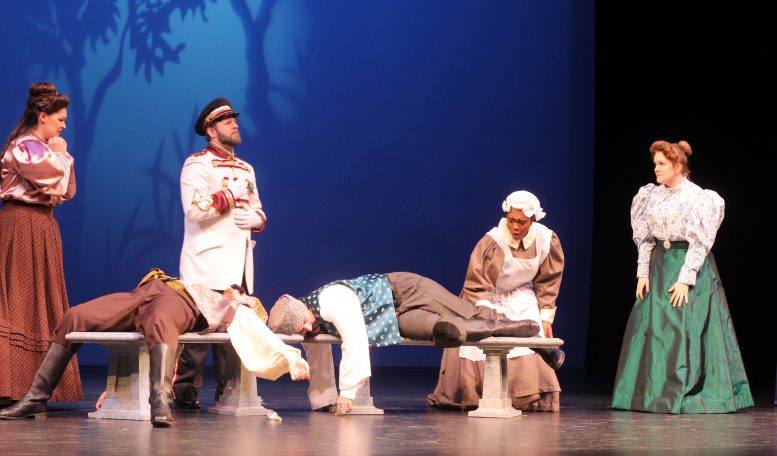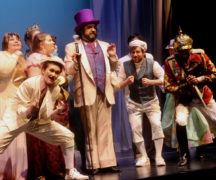By DAVID DUPONT
BG Independent News
These days even an opera from 1790 has to be viewed through the lens of #metoo.
That Mozart’s “Cosi fan tutte” can withstand what some would see as an anachronistic framing is a credit to his work. Everything else aside, the music is gorgeous and the BGSU Opera Theatre’s production does full justice to its melodic and orchestral delights of the score while nodding to its social complexities.
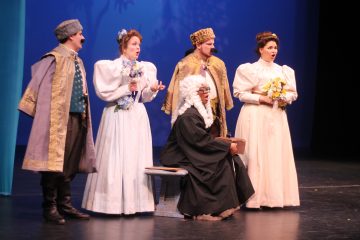
From left, Mark Tenerio, Caroline Kouma, Autum Cochran-Jordan, Ben Ganger, and Hillary LaBonte.
“Cosi fan tutte” by Mozart and his librettist Lorenzo Da Ponte will be presented Friday, March 23 at 8 p.m. and Sunday, March 25, at 3 p.m. in the Donnell Theatre in the Wolfe Center for the Arts. Advance tickets are $15 and $5 for BGSU students, and $20 the day of the show. Contact bgsu.edu/arts or 419-372-8171.
The production, directed by Jane Schoonmaker Rodgers plays up the artificiality of the tale.
The curtain comes up on a bare stage as the orchestra, conducted by Emily Freeman Brown, performs the gorgeous overture. As woodwinds duel and strings swell with punctuation by percussion and brass, a café proprietor (Tim Krueger) directs the setting of the scene as conceived by designer Bradford Clark.
The curtains are half drawn and draped, and the silhouettes of large windows are projected on the back wall. A café table is set as a maid (Bethany Waldick) diligently sweeps the stage. The proprietor returns throughout the opera to direct the scene changes, a fitting nod to stage business given the plot revolves around deception.
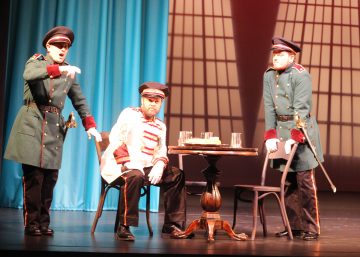
From left, Mark Tenerio, Nick Kottman, and Ben Ganger in opeing scene of “Cosi fan Tutte.”
Once the scene is set, the young soldiers Ferrando (Mark Tenorio) and Guglielmo (Ben Ganger) arrive to meet with their older friend Don Alfonso (Nick Kottman). The conversation turns to love, and the young men lavish praise on their lovers, how beautiful and faithful they are. The subtext is that the men consider themselves such wonderful catches that they can’t imagine the women being attracted to anyone else.
Alfonso begs to disagree. The women like all women – the title of the opera means “thus do all women” – will stray if given the opportunity.
The men are offended, almost to the point of dueling. Instead they make a wager and agree to test the young women. They will arrive in disguise to seduce them.
When we meet the sisters Fiordiligi (Caroline Kouma) and Dorabella (Hillary LaBonte) they too are singing about their lovers, and how much they love them and how they would never part from them. Even then the singers hint at the sisters being more enamored with the state of being love than maybe actually being in love.
Kouma and LaBonte establish their characters straight off. While the two guys are interchangeable, the two women are distinct.
Dorabella is the more volatile. She reacts almost violently when their chamber maid Despina (Autum Cochran-Jordan) pooh-poohs their romantic illusions. Fiordiligi, for her part, lounges on a settee, sips chocolate and eats sweets as she contemplates what the chambermaid is saying. The chemistry between LaBonte and Kouma is a delight throughout.
Alfonso enlists Despina into his plot. She’s too sharp to be deceived. Despina is disgruntled. She only gets to whip the chocolate, and smell it, but never drink it. The servant’s lot. Except she’s not above sneaking a sip.
Alfonso bribes her with a bag of gold, and the plot is set in motion. The idea is the young soldiers will pretend to be deployed far away much to the chagrin of their lovers, and then they will return disguised as foreigners, complete with preposterous moustaches and vaguely Eastern attire.
Cochran-Jordan has the ripest comic role. As part of her role in setting up the sisters for the faux seduction, she’s called on to impersonate a doctor and a notary. She roughens her otherwise lovely voice up to comic effect for these male roles.
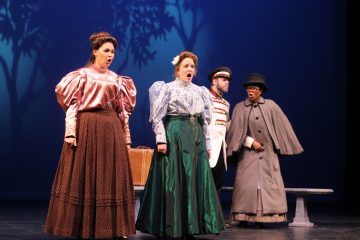
From left. Hillary LaBonte, Caroline Kouma, Nick Kottman, and Autum Cochran-Jordan.
What plays out is the definition of entrapment. The sisters firmly rebuff these strange men’s advances, even with the trusted Alfonso saying they could at least be friendly to them. There’s a fake death scene, and the strangers continue to express their ardor. Dorabella relents first, not surprising given her nature, and then ever so reluctantly Fiordiligi. Kouma is heart-breaking as she contemplates her conflicting emotions. Her character seems so much more a victim than a villain.
Tenorio’s Ferrando and Ganger’s Guglielmo are in the uncomfortable position of both wooing the other’s lover and seeing their lover being wooed, and then succumbing to another charms. Still it’s hard to feel sorry for them given they are active agents in their own heartbreak.
This is a comedy so only the divas’ hearts and illusions are harmed in the production. All the characters are the wiser at the end.
That the opera ends on a breezy, forgiving note shocked some of the original audience who thought such light consequences for betrayal was immoral. A contemporary viewer may wonder why no comeuppance for the perpetrators. If this were a contemporary entertainment, maybe that would come in a sequel.
The audience is likely to be so ensnared by the arias, ensembles, and orchestral music that they will set such compunctions aside until after Mozart’s melodies have stopped ringing in their ears.

